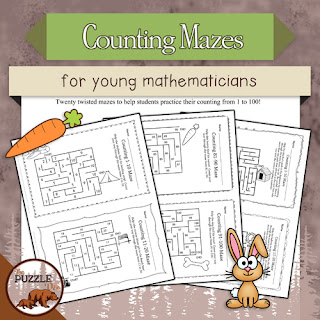I figured I should address how I think puzzles are beneficial in the various settings of the schoolroom, the homeschool room and the home. (Interesting how very related all these things are...school, home, room) And, or course, how they can be used in each setting by the instructors and students.
So let's address the public (and private) school setting first, since that's the biggest (the most kids and the largest facilities!) I can see puzzles being used as free time activities or for early finishers. This helps give students something fun to do, but is also a sneaky way of getting extra math/word practice in and developing those critical thinking skills too. Another way to use puzzles in the classroom would be in unit studies. For example, when learning about turtles, students could practice vocabulary with a word search or other word puzzle. My kids and I are now very familiar with the word "scute" after playing around with the Scute Number Match puzzle that I made. I don't think we'll ever forget what a scute is! As another example, I've been working on a geometry pack of puzzles. These could easily be integrated into a geometry unit to help practice and cement those feisty geometry terms! Classrooms today seem so busy, but I do think puzzles can be sneaked in somewhere in a beneficial way. Of course, I don't have any classroom experience myself, so these are just ideas. If you are a teacher and have some other ideas, please feel free to add a comment!
For homeschoolers, puzzles can be used in much the same way. Homeschoolers don't generally have free time to fill up. When you're done for the day, you're done, but puzzles can be used to supplement many different subject areas. History and science are two areas where homeschoolers sometimes have trouble keeping on target. (I know from experience! It's easy enough to get through the grammar, spelling and math, but when it comes to that science experiment at the end of the day...ugh!) I've found that just reading a history lesson doesn't always embed the facts into the student's brain, but the added activities (which can include puzzles!) are what really help. Exposure to a subject or idea over several days and in several different ways is a great way to "memorize" something without even trying! Of course, my favorite way of using puzzles in the homeschool classroom is during logic time. We've used several different logic programs which are fine in their own ways, but we have the most fun just doing puzzles. Puzzles really are a great way to flex the mind, and in my thinking, at grades 4 and 6, this should be the goal of a logic program. Plus, I love to sneak in some math facts practice hidden under the veneer of a fun puzzle!
For parents, puzzles are a great way to spend some time with your kids! I like to pull out a puzzle book at the end of the night and do a couple puzzles with my kids right before story time. (Yes, we still do story time at their ages!) Games Magazine has a fantastic book out for kids called "Kids' Big Book of Games". Here's a picture.

And Nickelodeon used to do a magazine packed with puzzles for kids that we thoroughly enjoyed. I don't know if they still make it, as I haven't seen it at the bookstore in quite some time. I so enjoy working on these puzzles with my kids. Sometimes, trying to solve a puzzle on your own is hard work, but pooling the resources of several brains together can really make it a fun and easy activity! I am always tickled at the insights my kids have. One night, we were working on a puzzle from the Games book where we had to identify states based on their shape. Some were rotated and the sizes were exaggerated and, quite frankly, I was a little bewildered! But my daughter (who was 8 at the time) was able to correctly identify almost all of them! What totally floored me was that we had never studied the US states before! These kids soak up info without my even realizing it! Anyhow, my biggest piece of advice for parents is to always make puzzle time something fun. If a puzzle gets too hard, move on and don't worry about it.
Wait, wait! I just thought of something else...Family time is a big deal these days, and I see commercials advertising board games being used as a fun family time activity. And it is! I love games too, and some of the best also teach critical thinking and problem solving skills. Here's a quick list off the top of my head of some of the better games in the puzzling world: Quirkle, Blockus, Blink, Set, Apples to Apples JR and Labyrinth. I'll write more on games later, but these are very good ones to get you started, that have the added bonus of not being too complex or having too many rules to learn.
I hope this post has helped give you some ideas about solving puzzles with kids! And if you need some puzzles to work with, I have two sets of puzzle freebies.
Cub Corner packs are for kids in grades K-3 and
Fun Friday packs are for grades 4-6. Of course, student abilities vary, so you should pick and choose which puzzles you think will fit best with your kids!


















